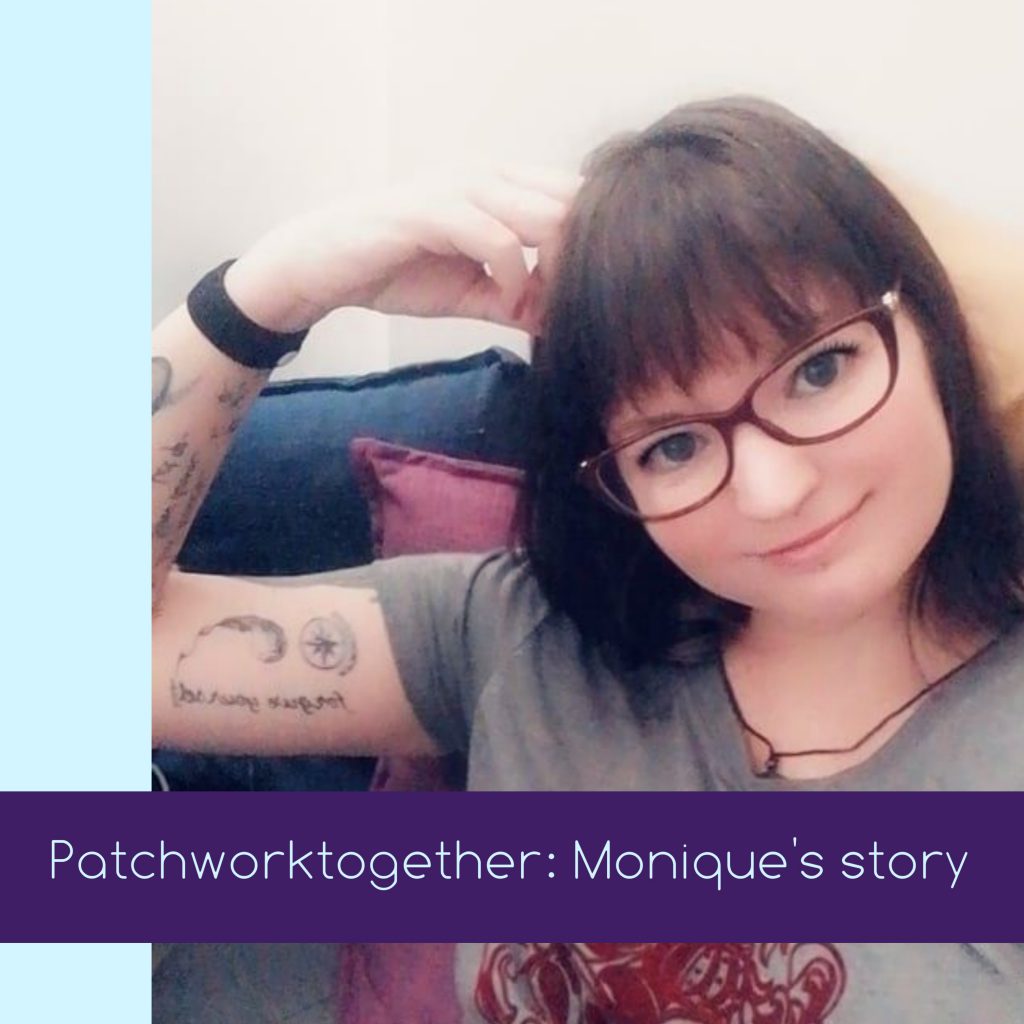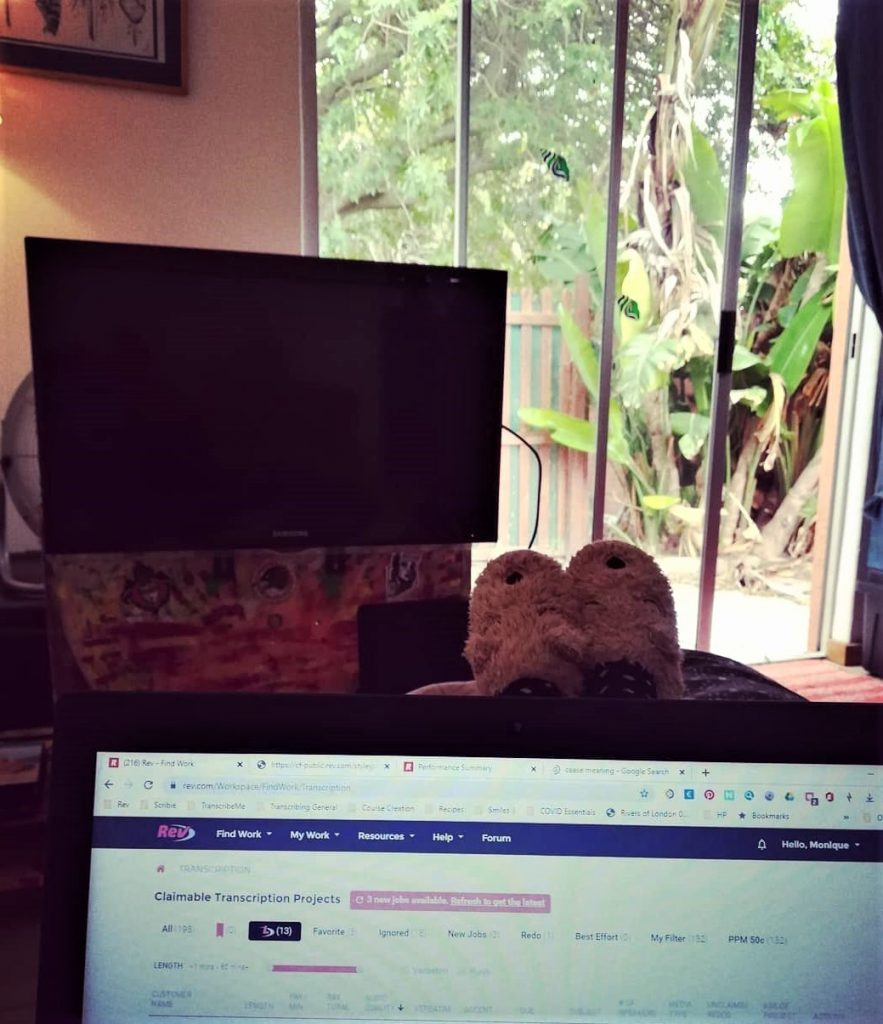-
Blog Views
805
Patchworktogether Spotlight: Monique’s Story
Monique is a Technical Writer from Cape Town and lives with fibromyalgia, chronic fatigue and chronic migraines. She has found innovative solutions to working while living with illness, or as she likes to think of it, being “health-challenged”. We spoke with her last month to find out her story and how she manages work alongside these health challenges.
To begin with, could you tell me a bit about your work?
I am currently working on a freelance basis for a transcription company, Rev.com. They currently have 50,000+ freelance transcribers, captioners and translators working all over the world, most of them from home. With Rev, I am able to hone my typing skills, as well as learn a variety of new things due to the nature of the work that we do. The audio files we get to transcribe vary in topics from health, politics, and law, to entertainment, sport, and podcasts. There is always something new to learn!
How do you find working from home? Do you have a home office?
I don’t have a proper table to work at, so we’ve made a kind of sofa/bed with blankets and pillows on the floor. We sit there and watch TV and series, etc. But I’ve basically just added my laptop into the mix here on the floor. The great thing about working from home is that I get to choose the hours I want to work, I can select the jobs that I want, and if I’m having a bad day health-wise, I don’t have to work and I don’t have a boss or colleagues that are disappointed in or mad at me! I also don’t need to go looking for clients as Rev takes care of getting the name out there, and the work just flows in. The peace of mind this has given me is immeasurable.

Are you more productive when working from home?
Yes, definitely. For chronically ill people, getting up early, getting ready for work, and then just getting to work is so draining that “normal”, healthy people just don’t understand. Taking a shower is exhausting in itself!
The energy I used to spend on all of the above I can now put into focusing on my work, picking the jobs I want to work on, and being productive while being comfortable in my own home. If I need to spend the day in bed working, I can do that. If I feel that I need to get out a bit and touch base with other human beings, I go sit at a coffee shop or at the local library and work with my earphones on. The flexibility is astounding!
I don’t have children so distractions at home are also minimum for me. Even when I was working full-time, I found that I was far more productive when we were allowed to work at home because of not having constant chatter or people distracting me at the office. I used to find it extremely frustrating when I was focused on a task, only to be interrupted by someone having a discussion near my desk or asking something unnecessarily. It takes me about a half an hour to get into “the zone” where I am completely absorbed by the work I’m busy with, and even a 1-minute break in concentration forces me to start all over again; another 30minutes to get back to where I was before the interruption. Being at home permanently now, this is no longer an issue.
Any tips for anyone who might also be dealing with chronic pain and fatigue while working?
I find that I have to take regular breaks. Even if it’s just to get up and stand outside in the garden. Or I stand in the kitchen and do some stretching exercises; slow, purposeful movements like balancing on one leg, holding the counter and swinging the other leg as far forward and backward as I can – a kind of slow, pilates thing.
But yeah, that’s been my biggest challenge thus far. I tend to get so involved with whatever I’m working on that I don’t realise I’ve been typing and concentrating on someone’s voice for over an hour and a half. Until that is, my body throws a tantrum like a teenager! But now that I’ve found a sort of rhythm, it’s going much better.
Have you ever had to stop work because of your health?
Yes, the combination of my health issues has resulted in me resigning from two companies now, although I really didn’t want to.
In the long run, I did what I thought was best at the time, as it wasn’t fair to the employers or my colleagues. They never knew when I’d be able to work at the office, attend meetings, or finish jobs to deadlines. This led to some of my colleagues having to “pick up the slack”, as it were. Which I absolutely hated!
I’m a perfectionist by nature and don’t like leaving things incomplete, but my health didn't give me any other choice. I also found that people’s understanding of my situation only lasted that long before they either became annoyed or thought I was just lazy or pulling a fast one; both of which destroyed my self-esteem and confidence in performing my job and led to major depression and anxiety, which caused me to not be able to get out of bed, let alone work.
What was your experience when working for these companies? Were they understanding?
WhenI first returned to work after massive pulmonary embolisms (clots in my lungs)in January 2016, my recovery was really slow due to damage to my lungs. My“slow integration” back to work didn’t help much I was basically earning less than half of my usual salary and I was the only breadwinner in the house. However, I was able to work my way back up to where I was before the incident.
With my last two jobs, I wasn’t as lucky I’m afraid. My second-to-last position was brought before HR and the Labour Department by my line manager, who really had it in for me, as well as a number of other chronically ill colleagues of mine. I wish more companies took mental health and chronic illness seriously.
In my last position, I was able to stay there for 19 months before things got out of hand. My father passed away at the beginning of last year and things rapidly deteriorated after that. In August I needed to book myself into a clinic to deal with my depression and was away from work for 5 weeks, as I happened to break my leg while in hospital too! After I was discharged, the company I worked for was extremely supportive and helpful. However, corporate patience can only last for so long. I was eventually told that I needed to step it up, or I would start getting warning letters. I didn’t want to leave on a bad footing with the company as they had been exceptionally good to me. I decided that it was in everyone’s best interest for me to resign.
How did you get back into work?
WhenI resigned, I was confident that I would find a new job in no time. How wrong I was!
I wasn’t able to find a permanent position that paid enough to cover my expenses, or some recruiters and companies didn’t want to hire me due to my ill health – not that I can blame them. This was extremely frustrating for me, as I enjoy working and keeping busy, but my health is so unreliable, even I don't know what’s going to happen on a day-to-day basis.
Finances became an issue as I couldn’t find work, my boyfriend and I broke up, and I just spiralled downward to the point of attempted suicide at the beginning of December. My wake-up call came when I woke up in ICU a few days after an overdose.
My sisters, who are both older than me, flew down to Cape Town to be with me and help me pick up the pieces. Fortunately, I had signed up with Rev.com earlier in the year, and I started looking into doing some part-time work through them until I could find something stable.
However, I soon realised that I could actually manage to make a living doing transcription work. Since we are paid in US dollars, I will soon be able to earn more than what I used to bring home from my permanent jobs!
What was the most useful support when this happened?
My most valuable support after I stopped working full-time was definitely my family and friends. I would not be here without them. The stress of losing your income is bad enough. Add to that the fact that you are viewed as someone who is lazy or pulling a fast one was just too much to bear. This, of course, all added to depression and anxiety, compounding all my other health issues.

Are you able to be open with your employers about how your health interacts with your work?
Being chronically ill has no effect on my current work situation since I work when I want and get paid for jobs completed.
In my previous positions, there used to be a definite sense of bum-in-seats in order to be viewed as “good” workers. Even if you didn’t do much, if you were at your desk, you were more valuable to employers than if you were productive but working from home due to ill health.
It is unfortunate, but some companies still have this view. I’m hoping that one positive to come out of the COVID-19 pandemic is that employers realise that working from home or telecommuting is a viable option these days.
How has the recent pandemic environment affected you?
since march last year, with the emergence of the COVID-19 pandemic, things slowed down significantly and there have been fewer projects coming in.
It was actually really frightening. It quickly went from looking at a list of thousands of projects and being able to be picky with what you want to work on, to staring at the message, “We currently do not have any new projects in the queue. Try again later.” It was scary!
Things are definitely picking up again though, what with more people working from home and doing online calls and Zoom meetings. Things should hopefully get back to normal soon, but we’ll get there. I am confident that, ultimately, some good will come from this pandemic through more opportunities being made available for people to work from home or work flexi-time.
If you could speak to past Monique a few years ago, when you were going through your diagnosis and really poor health, struggling to find work that wouldn’t make your health worse, is there anything you’d like to say to her?
Wow. This is a hard one!
You know, all I can think is: it has to end sooner or later. You can’t feel like this forever. When I think this, I always remember the line from the movie The Crow: “It can’t rain all the time.” Actually, it’s been a bit of an earworm for the past few weeks!
I sometimes wonder how I would have handled my health-challenged younger self if someone had taken the time to tell me that, yes, you will hurt so badly that you can't breathe at times. Yes, you will feel alone and as if people don’t believe you at times. Yes, even those closest to you, family and friends, will doubt or flat out refuse to believe you’re telling the truth and are really hurting. But forgive them. Their experience of your pain is not your experience of your pain. They have their own stuff to deal with.
Let it be, forgive them, and keep heaping as much love as you can possibly muster on yourself. Self-care is vital. Listen to your body. And don’t take it personally when it feels as if no one hears you, because you will feel like this at times. But you’ve made it through this far, and you’ll make it through again. Keep pushing through.
Tags
All Tags
Ability Connect Academy for Disabled Journalists Academy for Disabled SEO Specialists Access2Funding Accessibility Accessibility information Accessibility int he workplace Accessibility ramps Accessible education Accessible locations Accessible places Acid reflux Adaptive fashion Advocacy AI Aleto Foundation All Saints Alt text Aspiring Entrepreneurs with Disability Development Programme Assistive technology Autism Awareness Barriers Beth Kume-Holland Blog Budgeting Bullying BUPA Burnout Business Business Disability Forum Business model creation Business skills Business workshop Businesses Cancer Candidates Captions Cash flow Cerebral palsy Characters Charity Charity sector Chronic pain Closed captions Clothes Clothing Cognitive disabilities Comfort zone Communication Community networks Companies Company Company Corner Company culture Confidence Confucius Consultant Consultation Content creator Content designer Data talent Diagnosis Difference Digital and social media marketing Digital transformation Disabilities Disability advocate Disability advocates Disability and Neurodiversity Network Disability awareness Disability Awareness Training Disability community Disability confident Disability Confident Leader Disability employment Disability inclusion Disability news Disability Policy Centre Disability Pride Disabled Disabled candidates Disabled community Disabled founders Disabled people Disabled People’s Direct Action Network Disabled talent Disabled team Disabled-led Diverse Diverse workforce Diversity Diversity and inclusion Diversity Project Diversity Recruitment Platform Domestic violence Dysfluency ED&I EDDP Education Education and resource platform Employment opportunities Employment platform Empowerment Equality Act 2010 Ethnic minorities Eventbrite Expert teachers Expert training Fashion Fashion industry Fathom Feedback Finances Financial goals Financial planning Financial plans Financial services Financial services sector Flexible work Freelance FTSE 100 Fund management GAIN Game Gaming Gareth Walkom Garment technologist Gastrointestinal conditions Gem Turner Gender Gender Networks Grant Logan Guide dog Healthcare Hidden talent pool Homeworking Hospice UK Compassionate Employers Programme HR Hybrid working Ian MacKenzie Inclusion Inclusive culture Inclusive workforce Inclusivity India Inspiration Intellectual capabilities Interview process Interviews Investments Invisible disabilities Invisible disability Isaac Harvey Isaac Harvey MBE Istituto Marangoni Jack Wills Job descriptions Job interviews Job opportunities Job vacancies Journalism Journalists Learning disability Leeds Leeds trinity university Legislation LGBT Great LGBTQ+ Limb-pelvic hypoplasia LinkedIn LinkedIn influencer Listening service Lloyds Bank London London Fashion Week Long-term health condition Long-term health conditions Mapping days Mark Esho Matt Pierri Maya angelou Meta Metaverse Migrants Motivation Multinational firm Musculoskeletal conditions National Council for the Training of Journalists NCTJ Neurodivergence Neurodivergent Neurodiverse Neurodiversity consultant Neurodiversity space Neurotype Neurotypes New Delhi News Non-disabled founders Non-profit Novos OBS Occupational health Office environment Organisations Partially sighted Partnership Patchworkers People Phase Eight Phone calls Physical disabilities Pirate video games Policy Poverty Presentations Pride Network Primark Processes and systems Professional Women’s Network Progress Together Public speaking Puneet Singh Singhal Race Race and Ethnicity Network Raising awareness Registered blind Remote course Remote education Remote learning Remote work Removing barriers Resilience Revenue streams Rights School Scoliosis Scope Search engine optimisation Selection process Self-employed Self-employment Senior staff Sexuality Shaw trust Shaw trust power 100 list Sign language SJP Small Business Britain Social impact Social mission Social mobility Social-emotional learning Social-emotional learning platform Software Speaking situation Speech differences Speech disabilities Speech impediment Spotlight series Spotlight stories Ssstart St. James’s Place Charitable Foundation Staff Stammer Stammering Stonewall Stories Stuttering Sustainable change Sweaty Betty Target market Tech industry Tech talent TEDx Tesco Think tank Training Underrepresentation Unhidden Unhidden Clothing Universities University of Leicester Vanessa Castañeda Gill Victoria Beckham Video editor Video game Vimeo Violence Virtual reality VR Wealth management Web accessibility Wheels and Wheelchairs Women Work environment Work from home Working conditions Working Families Group Working from home Workplace adjustments Youth Zoom Abc Ability Today Access to work Accessibility in the workplace Accessibility test Accessible work Acting Adhd Adjustments Administrative Adrian lord Advice Advocacy and campaigns Allparty parliamentary group for inclusive entrepreneurship American civil rights movement Android Anglonorman App Artificial intelligence Bad grammar Barriers to work Bbc Benefits Blind persons act Blue badge Blue badge service specialists Care Career Carer Celtic languages Center on everyday lives of families Ceo Cfs Chloe tear Chronic fatigue syndrome Chronic health condition Chronic illness Commodo aute beatae Community Community story Community, community story, founder, feature, accessible work, disability employment gap, making a difference Companies house Compressed hours Computer science Computers Coronavirus Councils Covid19 Crystal mark standard Deaf Design Dialects Dictionary Digital accessibility Disability Disability discrimination act Disability employment gap Disability rights movement Disability services Disabled peoples direct action network Disabled persons employment act Disabled-led organisation Easy read Edit Tag Test 2 Email address Employer Spotlight Employers Employment English English speakers Entrepreneur Entrepreneurship Epilepsy Equality Equality act Equality and diversity Equality of access Esources, disability, disability services, support services, community story, features, adjustments, social support network Esse vero eum nisi a Eugenics Facebook Feature Features Fibromyalgia First world war Flexi Flexible working Flexitime Flextime Founder Francesco cirillo Freelancing French Gcses Gdpr General data protection regulation Good Good grammar Google Government policy Government support Graduate Graduates Grammar Grammar schools Health Health condition Health conditions Hearing impairment Help And Support Tags History History of language Holistic Ico Impact Imposter syndrome Inclusive entrepreneur network Inequalities Inequality Information commissioners office Information governance Instagram Internet Jacqueline winstanley Laborum Magna moles Language Latin Law Learning difficulties Lexicographers Limited company Local councils Local government Making a difference Marketing strategy Mecfs Medical conditions Medical model of disability Medical vs social models of disability Medicines Mental health Middle english Mindfulness Mlm Mobility issues Molestias quod sapie Multilevel marketing Nam eaque iure aut v National league of the blind Neurodiversity Nihil corporis aliqu Niya Normans Old english Old french Onboarding and retention Online Out of work Oxbridge Parent Passwords Patchwork hub Payment details Planning Planning for work Podcasts Pomodoro Preposition Private schools Psychiatric Psychiatry Punctuation Qui voluptatem debi React Reasonable adjustments Recruitment Remote working Resources Resources and support Rest Retinopathy of prematurity Sales Scam Search engine Second world war Shell shock Slang Sociability Social Cipher Social interactions Social media Social model of disability Social support network Socialising Spelling Spoken language Spotlight series Spotlight stories St. James’s Place Standard english Startup State schools Student Students Studying Suffragette movement Support Support services Syntactician Syntax Tag Technology The Disability Policy Centre The elderly Then barbara met alan Trafalgar square Turkish United nations Universal inclusion University University of arts london University of cambridge University of hertfordshire University of hull University of leeds University of oxford Victoria Jenkins Visual impairment War Ways of working West germanic dialects William shakespeare Windsor consultations WithVR Wordpress Work structure Workforce recruitment Working environment Workplace barriers World war one World war two Young carer




